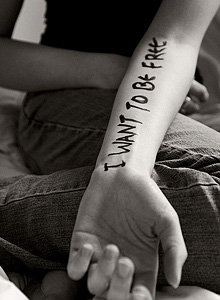
|  |  |  Health & Beauty | July 2008 Health & Beauty | July 2008  
Young Girls Think Self Harming is a Normal Way of Managing Stress
 Joanna Sugden - UK Times Online Joanna Sugden - UK Times Online
go to original


| | Cutting is one of the commonest forms of self-harm in young girls. Anxiety is brought on by exams, celebrity culture and pressure to grow up too quickly. | | |
Young girls consider self-harm to be normal teenage behaviour, according to research by mental health and volunteer organisations published today.

A study of the attitudes of 10 to 14-year-old girls found that two fifths know someone who has harmed herself and many believe it to be an accepted way of dealing with teenage angst.

Andrew McCulloch, chief executive of the Mental Health Foundation, the group behind the research, said the trend was worrying.

“Self-harm is so common when dealing with stress that it's seen as normal,” he told The Times. “It's a sign that we're failing to give young women the lives that we should be giving them.”

Self-harming can be triggered by emotionally distressing events such as bullying or family breakdown.

The most common forms are cutting, burning, scratching, hair pulling and swallowing objects or toxic substances.

A national inquiry on the subject published in 2006 found that one in 15 young people harmed themselves and latest estimates indicate that three teenagers deliberately injure themselves every hour.

The results of the survey suggest that widespread anxiety among a generation of young girls is brought on by exams, celebrity culture and the pressure to grow up too quickly.

One third answering the online questionnaire said that a friend had suffered from an eating disorder and nearly two in five knew someone who had panic attacks. Three quarters admitted feeling anxiety about testing and schoolwork.

When asked during face-to-face interviews about self-harm, many girls felt strongly that it was a typical teenage coping strategy. They said that it was not necessarily a sign of mental health problems as long as the person was not self-harming regularly.

One girl who took part in the research said: “I think cutting your arm the first time you do it is OK - it might just be stress.”

Not until someone had cut themselves deliberately three times would it be considered a mental health issue, she added.

Dr Tanya Byron, a child psychologist, said that more and more young people were harming themselves. It was a behaviour of choice for young people. “Among young peer groups a number of them will take up self-harm together as part of the emo culture,” she said.

The teenage sub-culture emo, short for emotional hardcore, is associated with self-harm and originates from the alternative US music scene.

Another girl in the study spoke of a friend who cut her own wrist. “She was doing it to fit in with the emos,” she said.

Dealing with extreme swings of emotions was difficult for most girls, according to the study, with half saying that they found anger hard to manage and one in six often having angry feelings. Twenty-eight per cent said that they worried regularly and felt that no one understood them.

The survey of more than 350 girls aged 10-14 and in-depth focus groups was carried out for Girl Guiding UK, Britain's largest voluntary youth organisation, which has about 580,000 members.

Lesley Knighton, the chief commissioner of Girl Guiding UK's Midlands region, said: “What concerns us is that girls are facing tremendous pressure today. Self-harm could be a result of this pressure. The girls feel that they are being required to grow up too quickly.”

Giorgia Smith-Marr, 15, a guide from West London, said that she knew at least three people her age who self-harmed.

She said: “It's how people cope, because there are so many problems. It's not surprising that they act in self-destructive ways.”

CASE STUDY

I've been self-harming since I was 5. I started by pulling my hair out and ripping the skin off my fingers. Then I used razors to cut my arms, legs and stomach. As I got older, I stopped speaking to people when I was stressed and began taking my anger out on myself. I always have a razor with me so that if I want to do it, I know it's clean. When I first cut myself I felt better, but afterwards I felt gutted that I had done it. The more upset I got, the more pain I inflicted on myself. Once I cut my face because people were saying I was ugly.

I've had more stitches than I can remember. I don't do it often now and have a great support group where I go and have a cry if I feel upset. A lot of people self-harm for attention but they need to get help, it's not worth the scars. |

 |
|  |



